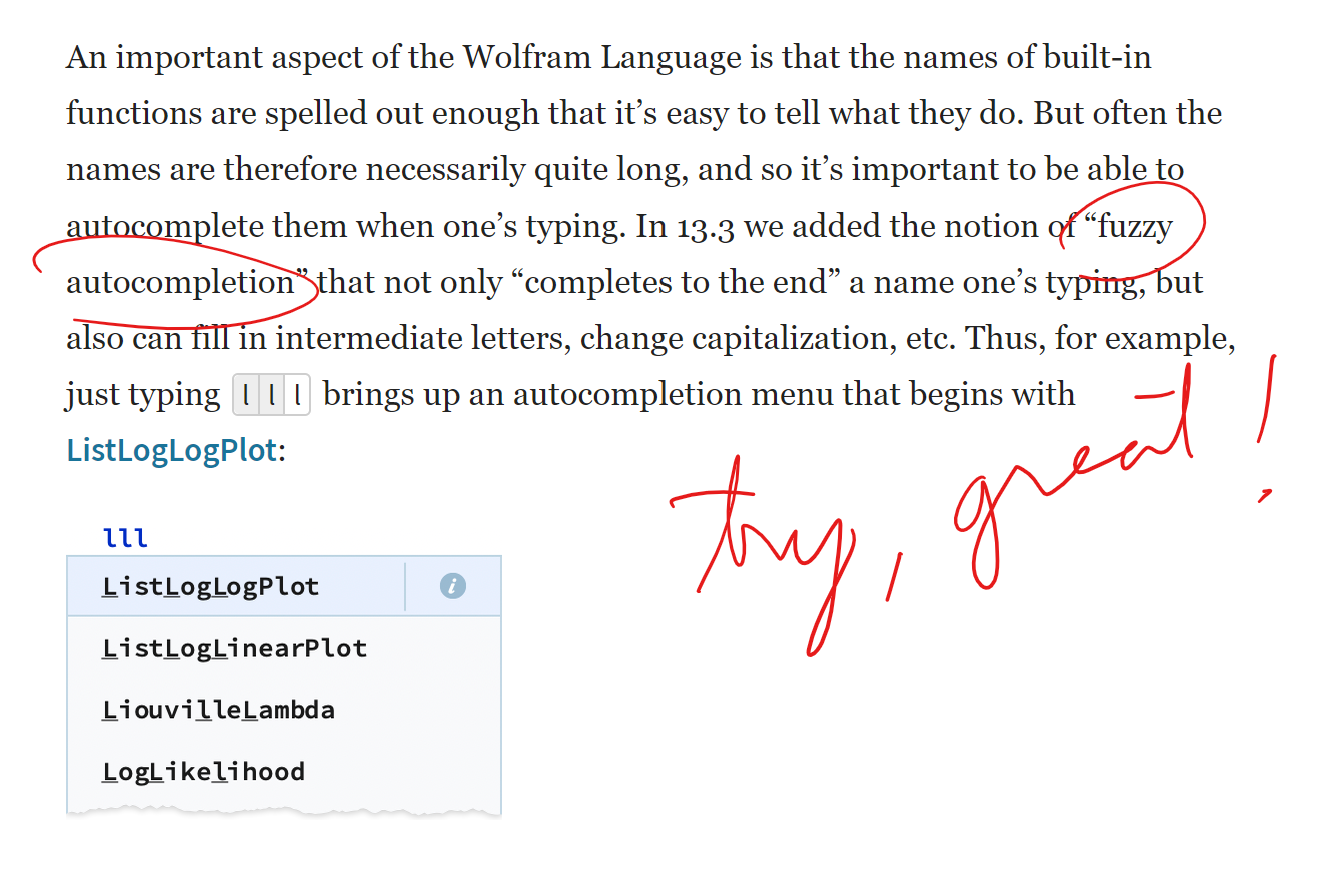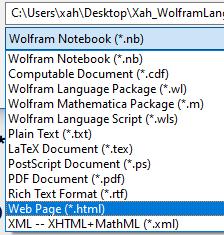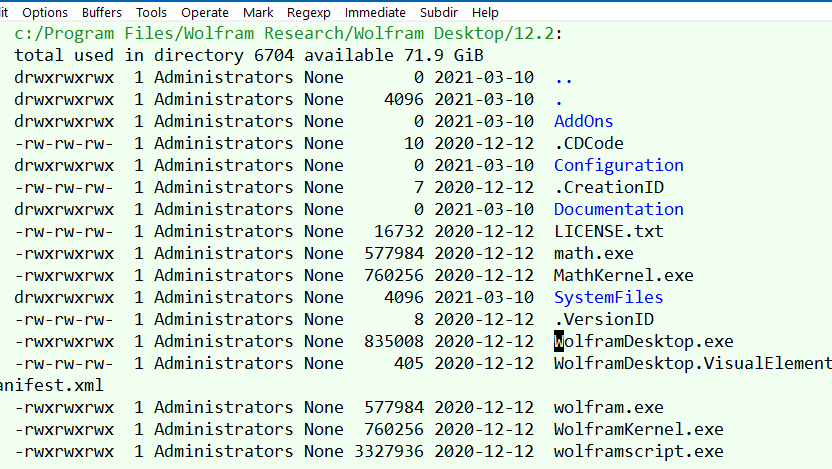xtodo WolframLang
- 2024-03-26 more update on transform 2d plot
- 2024-03-26 more update on tiling package
- 2024-03-26 update plane curve site
wstp wolfram symbolic transfer protocol
- https://www.youtube.com/watch?v=nXVEOUMZbzQ
- Developing Wolfram Language Code in Other Editors and IDEs with LSP
- Wolfram
- Dec 31, 2021
- unit test.
VerificationTest- VerificationTest
notes, work in progress
xtodo- list hidden files
- list empty files
- List Only Files, No Directory
- Count Number of Files
- List File Creation Time
- Delete File by Wildcard Pattern
- Create New Directory
- Copy Directory
- Delete Directory
- List Directory Only
- List Empty Directories
- Show Directory as Tree
- show Directory Size
- show sizes of subdirs
- Create New File
- Delete a File
- copy file
- join files
- compare files
- search text by literal string (case sensitive or none)
- search text by multiple strings
- search text by regex
- zip
- unzip
- gz
- ungzip
- tar
- untar
try
- try
- LLMSynthesize

- to read
- WolframLang version 13
- https://writings.stephenwolfram.com/2021/12/launching-version-13-0-of-wolfram-language-mathematica/
- https://writings.stephenwolfram.com/2022/06/launching-version-13-1-of-wolfram-language-mathematica/
- https://writings.stephenwolfram.com/2022/12/the-latest-from-our-rd-pipeline-version-13-2-of-wolfram-language-mathematica/
function repo
- function repo
- https://resources.wolframcloud.com/FunctionRepository/
- https://resources.wolframcloud.com/FunctionRepository/style-guidelines
- wolfram submissions pending status https://resources.wolframcloud.com/publisher/submissions
- recent https://resources.wolframcloud.com/FunctionRepository/recent
programatically turn a expression into a function
th[ft_Function , xrest___] := tt[ With[{expr179= ft@argHq2Ky}, With[{x881= First@ expr179, y804= Last@ expr179}, {x881, y804} /. argHq2Ky -> #1 ] ] , xrest] /; SameQ[Length@ ft, 2];
paclet package repo
- 2024-02-15 check the paclet repo. read in detail. especially check how to doc.
- Paclets
- wolfram resource system
- https://resources.wolframcloud.com/
- WolframResourceSystem
how to print in binary, hex.
- https://writings.stephenwolfram.com/2023/03/chatgpt-gets-its-wolfram-superpowers/
- https://writings.stephenwolfram.com/2023/04/instant-plugins-for-chatgpt-introducing-the-wolfram-chatgpt-plugin-kit/
- https://resources.wolframcloud.com/PromptRepository/
- https://writings.stephenwolfram.com/2023/05/the-new-world-of-llm-functions-integrating-llm-technology-into-the-wolfram-language/
(* \|01f469 *) StringLength[ FromCharacterCode[{128105, 8205, 128300}]] === 3 (* StringLength["\|01f469"] *)
- 2022-08-01 need test using diff encoding for WolframScript Wolfram Language File Encoding
- 2021-11-19 clear xah wolfram language notes
pattern matching issues
- number of rules.
assume just 1 rule:
- whole expression or parts
- if parts, issue of sequential items vs levelspec
- when to stop: stop at first match e.g. 「{x,x}」, just one part.
- when to stop: stop at first match, all?.
Replace[ f[x,x] , {x -> 3, y -> 4}, {1, Infinity } ] (* f[3, 3] *)
- Replace[expr,rules,levelspec]
- levelspec default to {0}
- A list of rules can be given. The rules are tried in order. The result of the first one that applies is returned. If none of the rules apply, the original expr is returned.
- If the rules are given in nested lists, Replace is effectively mapped onto the inner lists. Thus Replace[expr,{{r11,r12},{r21,…},…}] is equivalent to {Replace[expr,{r11,r12}],Replace[expr,{r21,…}],…}.
- Replace
- ReplaceAll looks at each part of expr, tries all the rules on it, and then goes on to the next part of expr. The first rule that applies to a particular part is used; no further rules are tried on that part or on any of its subparts.
- ReplaceAll applies a particular rule only once to an expression.
- ReplaceAll
(* WolframScript does not behave the same as notebook. In notebook, these eval correctly. in WolframScript, they do not. *) StringCases[ "αβ🌞ab", StringExpression[ LetterCharacter.. ] ] (* {Î, Î, ð, ab} *) StringCases[ "πσ", StringExpression[ "ΠΣ" ], IgnoreCase -> True ] (* {} *)
Attributes[ CompoundExpression ] (* {HoldAll, Protected, ReadProtected} *) (* CompoundExpression *) FullForm[ a;b;c ] (* FullForm[c] *) FullForm[ Hold[ a;b;c ] ] (* FullForm[Hold[a; b; c]] *) FullForm[ HoldForm[ a;b;c ] ] (* FullForm[HoldForm[a; b; c]] *)
What's the difference between Hold, HoldForm, Unevaluate


# list file path of WolframLang Get-Command wolframscript.exe | Format-List Source # on windows, it's usually at # C:\Program Files\Wolfram Research\WolframScript\wolframscript.exe
on linux or MacOS, type which wolframscript
- 2022-05-14 find out where WolframLang package located is. builtin, and user addon.
- 2022-05-14 read the char encoding WolframLang: Script to Find/Replace Strings in a Dir
2022-05-13, commented on
https://reference.wolfram.com/language/ref/ParametricPlot.html
the two examples with Exclusions, has no effect.
ParametricPlot[{Tan[u], u}, {u, 0, 2 Pi},
Exclusions -> Range[Pi/2, 2 Pi, Pi]]
ParametricPlot[{Tan[u], u + v}, {u, 0, 2 Pi}, {v, 0, 1},
Exclusions -> {u == Pi/2, u == 3 Pi/2}, Axes -> None]
- Math of Seashell Shapes
- Torus
- Geometric Inversion, WolframLang Code
- WolframLang: Plot and Visualization
- WolframLang figure out, DiscretizeGraphics and DiscretizeRegion returns a MeshRegion.
- 2022-07-06 WolframLang write Level, Apply, Sequence
sequence specification:
All→ all elementsNone→ no elementsn→ elements 1 through nUpTo[n]→ elements 1 up to at most n, as available-n→ last n elements{n}→ element n only{m,n}→ elements m through n inclusive{m,n,s}→ elements m through n in steps of s
All- all elements
None- no elements
n- elements 1 through n
UpTo[n]- elements 1 up to at most n, as available
-n- last n elements
{n}- element n only
{m,n}- elements m through n inclusive
{m,n,s}- elements m through n in steps of s
- Replace[expr,rules,levelspec]
- levelspec default to {0}
- A list of rules can be given. The rules are tried in order. The result of the first one that applies is returned. If none of the rules apply, the original expr is returned.
- If the rules are given in nested lists, Replace is effectively mapped onto the inner lists. Thus Replace[expr,{{r11,r12},{r21,…},…}] is equivalent to {Replace[expr,{r11,r12}],Replace[expr,{r21,…}],…}.
- ReplaceAll looks at each part of expr, tries all the rules on it, and then goes on to the next part of expr. The first rule that applies to a particular part is used; no further rules are tried on that part or on any of its subparts.
- ReplaceAll applies a particular rule only once to an expression.